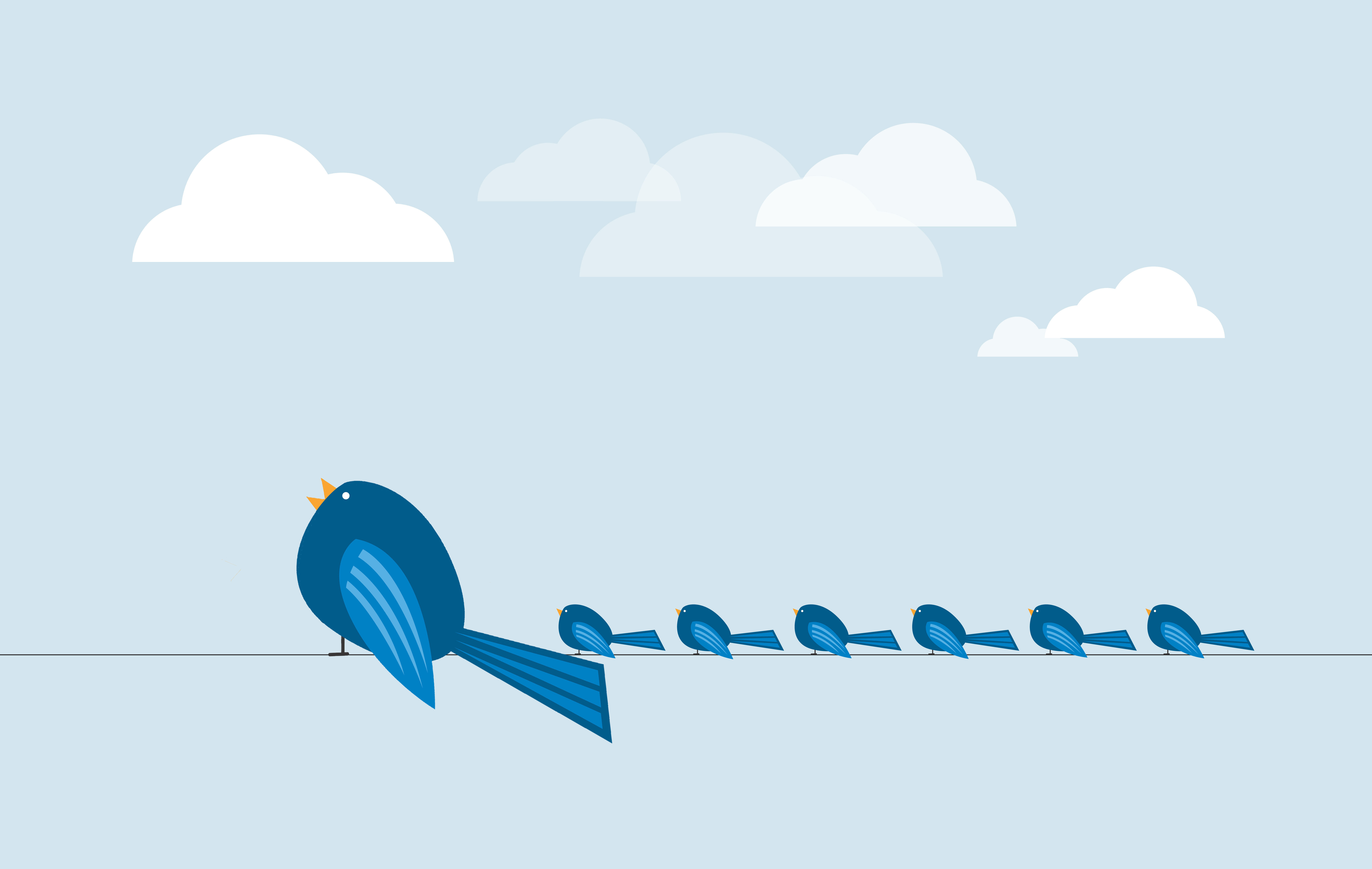7 theories for why Twitter loves lists
Our love for short and shapely opinions seems to know no bounds


A free daily email with the biggest news stories of the day – and the best features from TheWeek.com
You are now subscribed
Your newsletter sign-up was successful
According to people far smarter than I am, the human brain processes information spatially, which makes lists particularly appealing. As Walter Kintsch pointed out in a 1968 study (which is not, unfortunately, written in the form of a list), compiling thoughts into a list imparts order, a visualization to lodge in our minds.
In the past week, a new riff on an old trend has emerged: Goaded by hashtags and the pressure to do what everyone else on your feed is doing, Twitter users are making lists of their favorite things — films, TV shows, directors, albums, etc. — into groups of seven, probably very hastily, and throwing these quickly-curated selections into the public sphere for evaluation. Why do we love doing this to ourselves? Here are seven theories:
They provide structure.
The Week
Escape your echo chamber. Get the facts behind the news, plus analysis from multiple perspectives.

Sign up for The Week's Free Newsletters
From our morning news briefing to a weekly Good News Newsletter, get the best of The Week delivered directly to your inbox.
From our morning news briefing to a weekly Good News Newsletter, get the best of The Week delivered directly to your inbox.
People have always loved lists and the figurative structure they offer, from the Ten Commandments to Sight & Sound's once-every-10-years poll of the Best Movies Ever, but Twitter presents a unique spin on the list's allure. Twitter is a structure erected in the mire of the internet. Lists present order. Twitter, like the list itself, renders the nebulous nature of communication on the internet into a discernible shape, so it makes sense that lists trending on Twitter will get 100,000 unique interactions. Hashtags and lists go together especially well, since hashtags also provide structure.
Writing micro memoirs.
These lists are succinct, accessible memoirs for pop-culture connoisseurs. We share pieces of ourselves with the world, each list a new chapter in a story that keeps changing. Lists help us easily identify the ways in which we stand out from our peers and associates (or, for cinephiles, that dreaded IMDb top 250). But it also makes us feel connected, as Werner Herzog might opine, being able to quickly and painlessly exchange shapely opinions with the rest of the internet. You feel at once unique, yet vindicated by popular consensus, though not tethered to it. In the blithe torrent of Tweets materializes patterns, personas. Are lists craquelure in the veneer of an online persona, or fine strokes that help make that persona?
Insanely easy to write.
A free daily email with the biggest news stories of the day – and the best features from TheWeek.com
And since there's not much time for cogitation, these lists (which most people have probably been compiling for years, whether consciously scrawled in the backs of Moleskines or unconsciously collecting like dank pools in the recesses of the mind) feel honest, even if they are, innately, curated. Researching, writing, and editing an essay takes a lot of time and thought, but typing up a list — which many sites consider to be #content today — takes almost no time. There's no explanation necessary. You just write your list and send it off into the abyss of Twitter.
They're easy to remember.
Have you ever found yourself quoting a Tweet, or saying, "Who Tweeted that stupid thing the other day about learning to tolerate Steven Spielberg?" Tweets are short, simple, often silly, and excessively easy to process. List Tweets are even easier to process and remember. There's no analysis necessary, no critical reading required...
They're ambiguous.
...But, of course, you'll inevitably end up analyzing everyone's list, and trying to project meaning on why someone would list Fight Club as one of their favorite films, and judging people's tastes and opinions, even if you swear you're above that. Lists without context are intriguingly ambiguous. You can't help but try to vivisect someone using their lists as scalpels. And, because they consented to this by making the list public, you don't have to feel any guilt.
Everyone is doing it.
The constant noise of strangers' Tweets can have a comforting feeling, akin to the oscillations of a fan. Though not everyone's opinion is equal, and while there is certainly a hierarchy to Twitter measured in followers and blue badges, both of which can be obtained through the proper channels and some coercion, Twitter promises a certain kind of equality. Your list can coexist with Matt Zoller Seitz's list, giving you the feeling of being peers. Maybe if you're lucky you'll get a retweet. One of us, one of us. Goble gobble.
Remember when? Nope.
Even if nothing on the internet truly dies (unless we get a solar flair that wipes out all the electronic devices in the world, which, as Werner Herzog's Lo and Behold points out, is a distinct possibility), Tweets are particularly fleeting. If you don't like your list, you can just tweet a new one later and no one will notice. Except for those people who make it their duty to search old Tweets and @ you unsolicited. To which I say, come @ me.
Greg Cwik is a writer and editor. His work appears at Vulture, Playboy, Entertainment Weekly, The Believer, The AV Club, and other good places.
-
 Samurai: a ‘blockbuster’ display of Japanese heritage
Samurai: a ‘blockbuster’ display of Japanese heritageThe Week Recommends British Museum show offers a ‘scintillating journey’ through ‘a world of gore, power and artistic beauty’
-
 BMW iX3: a ‘revolution’ for the German car brand
BMW iX3: a ‘revolution’ for the German car brandThe Week Recommends The electric SUV promises a ‘great balance between ride comfort and driving fun’
-
 Munich Security Conference: a showdown between Europe and Trump?
Munich Security Conference: a showdown between Europe and Trump?Today’s Big Question Report suggests European leaders believe they can no longer rely on the US for military support – but decoupling is easier said than done
-
 How do you solve a problem like Facebook?
How do you solve a problem like Facebook?The Explainer The social media giant is under intense scrutiny. But can it be reined in?
-
 Microsoft's big bid for Gen Z
Microsoft's big bid for Gen ZThe Explainer Why the software giant wants to buy TikTok
-
 Apple is about to start making laptops a lot more like phones
Apple is about to start making laptops a lot more like phonesThe Explainer A whole new era in the world of Mac
-
Why are calendar apps so awful?
The Explainer Honestly it's a wonder we manage to schedule anything at all
-
 Tesla's stock price has skyrocketed. Is there a catch?
Tesla's stock price has skyrocketed. Is there a catch?The Explainer The oddball story behind the electric car company's rapid turnaround
-
 How robocalls became America's most prevalent crime
How robocalls became America's most prevalent crimeThe Explainer Today, half of all phone calls are automated scams. Here's everything you need to know.
-
 Google's uncertain future
Google's uncertain futureThe Explainer As Larry Page and Sergey Brin officially step down, the company is at a crossroads
-
 Can Apple make VR mainstream?
Can Apple make VR mainstream?The Explainer What to think of the company's foray into augmented reality
